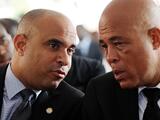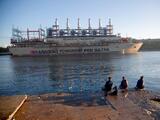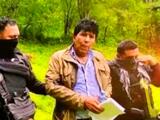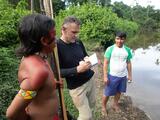What did Nery know? A prison murder in Honduras deepens suspicions of government involvement in drug trafficking
(Lea este articulo en español)
TEGUCIGALPA - A security camera captured the gory scene at a maximum security prison in northern Honduras in late October.
A guard wearing a face mask slides open a bright red security door and six inmates wearing white t-shirts leap out, one armed with an Uzi sub-machine pistol, and open fire, instantly killing their target.
The victim, Nery López Sanabria, was a 37-year-old drug trafficker whose ledgers were used in a New York trial a few days earlier to convict Juan Antonio ‘Tony’ Hernández, a younger brother of Honduras’s president, on drugs and weapons charges.
López never testified in the trial as he was jailed in Honduras. However, he had been in discussions with the U.S. Drug Enforcement Agency for several months prior to his murder, according to four lawyers familiar with his efforts to cooperate with the U.S. officials.
Some of those lawyers now wonder aloud if his cooperation with the DEA – and high-level political connections - may have gotten him killed.
“Those who knew who [he] was, would be fearful of his becoming a DEA collaborator,” López’s lawyer, Carlos Chajtur told Univision. “I sensed that this would happen, that he’d be killed, his problem is that he had a lot of information and had the accounting to prove it,'' added Oscar Arroyave, a Miami lawyer familiar with case.
The horrific video of his assassination further scandalized a country already reeling from the shocking allegations of high-level drug trafficking implicating President Juan Orlando Hernández. Meanwhile, the White House has stood by Hernández, with President Donald Trump calling him a "fantastic" ally in the administration’s efforts to contain migration from Central America.
At his trial, Tony Hernández vehemently denied the charges against him, including supposed references to him in the drug ledger of López. President Hernández, who prosecutors identified as an unindicted co-conspirator in the case, also rejected the allegations, describing them as a fairy tale, akin to Alice in Wonderland.
A lawyer for Tony Hernández declined to discuss matters relating to the case pending sentencing on January 17. President Hernández declined to answer questions from Univision relating to the death of López. He faces a possible maximum sentence of life in prison.
The ledgers
The ledgers were one of the highlights of the New York trial, and were described by prosecutors as “devastating evidence” of the defendant’s guilt. In his closing argument, prosecutor Emil Bove stated, “that ledger by itself proves that the defendant (Tony Hernandez) was a participant in this drug trafficking conspiracy. You really don't need much more than that.”
He noted how the name 'Tony' appeared alongside apparent references to cocaine shipments.
Bove accused President Hernandez of taking money from drug traffickers, including $1 million from Joaquín 'El Chapo' Guzmán, for his political campaigns and putting the Honduran military and police at the disposal of his brother, in what he called “state-sponsored drug trafficking.”
Tony Hernandez’ lawyer, Michael Tein, sought to discredit the ledgers during his closing argument, alleging they were “planted” by corrupt Honduran officials. “Anything that relates to that ledger you throw out. It's not trustworthy,” he told the jury.
Tein cited alleged failures in the police procedures to properly secure evidence in the case, including the ledgers which were seized during the arrest of López and his wife, Erika Bandy, at a military police road block in the north of Honduras on June 6, 2018.

The arrest, June 6, 2018
Univision obtained copies of the arrest report, which are not public, including details of the search of their car, a Toyota land cruiser, as well as another vehicle accompanying them. The report, submitted to the office that handles organized crime prosecutions, confirms the discovery of nine spiral notebooks, as well as $193,000 in cash, five luxury Rolex watches, and a number of hand guns (one with a silencer), in a hidden compartment under the seat of the second car.
While the arrest report contained photos of the evidence seized, it did not include pictures of the notebooks, showing only a black zippered file folder, in which they were supposedly found.
Univision spoke to several sources, including two officials involved in his capture, who confirmed the notebooks were found at the scene. Univision also obtained a copy of the notebooks from a source familiar with the investigations.
The road block was set up after Honduran intelligence agents received a tip that López was in the area and would be passing along a road near the town of Naco, the sources said.
The couple were on their way home to their ranch in Quimistan in the north of Honduras to celebrate the birthday of López. The arrest report includes a photo of the birthday cake that awaited them at home.
López put up no resistance, though he did try and bribe the officers at the scene, according to one official.
After the couple were handcuffed they were taken to a nearby military battalion for questioning. López had been using a false identity for several years after his name began to surface as a suspected drug trafficker. He even staged his own funeral in 2015, including photos of himself in the coffin, and assumed the name Magdeleno Meza Funez. He also underwent plastic surgery, slightly altering his appearance. After his arrest investigators appear to have quickly established his real identity, according to the police report.
DEA investigation
López and his wife operated a large ranch with 400 head of cattle, according to the investigators who visited the property in Quimistan.
Like many Honduran traffickers, López had managed his operations with virtual impunity for several years with the help of corrupt Honduran police and politicians, according to police reports. But that began to change after the Honduran government agreed to create special DEA-vetted counter narcotics police teams, known as SIU (‘Sensitive Investigative Unit’) in late 2012.
According to numerous reports from the SIU, obtained by Univision, Honduran authorities were investigating López since at least September 2016. Within months, the SIU had discovered the alias López was living under, the location of his ranch and intercepted phone calls of associates discussing drug trafficking activities.
In the New York trial, prosecutors alleged that López had been providing logistics for some of Honduras’ major drug traffickers, including Víctor Hugo Díaz Morales, alias 'El Rojo’ and Devis Rivera, leader of the ‘Cachiros’ drug gang, who are both in U.S. custody and testified against Tony Hernández.
The name ‘Alex’ also appears frequently in the drug ledgers, who appears to be Alexander Ardón, a former National Party politician who also testified against Tony Hernández. Ardón stunned the jury by describing his involvement in delivery of a $1 million contribution by Mexican drug lord, Joaquin ‘El Chapo’ Guzman, to the 2013 election campaign of Juan Orlando Hernández.
Helicopter
A video obtained by Univision from Honduran law enforcement sources, supposedly shows a blue Bell 407 helicopter taking off from López’s hacienda carrying Tony Hernández. The video does not show who the occupants are nor is the registration number visible.
During the Hernández trial, prosecutors showed various photos of helicopters, alleging that they were used by him to conduct his drug business.
Carlos Chajtur, a lawyer for López said Honduran prosecutors have documents showing that a helicopter was purchased for Tony Hernández in Guatemala by his client, though he said he has not seen the documents. The drug ledgers also include several mentions of a helicopter and related purchases in Guatemala.
The U.S. Justice Department did make a formal request to Honduran authorities in April for documents about a helicopter, a Bell 429, with the registration HK-GCA, in relation to the Tony Hernández trial, according to court documents. It’s unclear if any information was provided.
Prison
After his arrest, López came under intense pressure from Honduran prison officials and representatives of Tony Hernández to keep silent and not to cooperate with U.S. law enforcement. That included alleged punishment and torture, as well as several previously undisclosed prison visits by a member of the Hernández family and a Miami private investigator hired by the family, said Chajtur.
After apparently rebuffing initial overtures from Honduran lawyers for Tony Hernández, he was moved to a maximum-security prison in the north of the country, at Ilama, dubbed ‘El Pozo’ (The Well).
He spent weeks in solitary confinement, on a diet of bread and water, according to Chajtur. He lost 26 pounds before his lawyer got his moved to a regular cell after complaining about his case to Honduran human rights groups.
“We were looking at the possibility of getting him transferred to another lower security jail, where maybe even he could be visited by a prosecutor or an investigator,” said Chajtur.
In fact, Chajtur said his client had instructed him to contact the U.S. Drug Enforcement Administration in Miami. Chajtur said he arranged for a lawyer in Washington, Robert Feitel, to visit him in jail in February.
“He seemed knowledgeable and forthright. We exchanged information, the details of which we cannot discuss due to attorney-client privilege which still exists even after his death,” Feitel told Univision. “We continued to try to further his case. Unfortunately, our client’s astonishingly brutal murder ended these efforts.”
Chajtur now believes that visit may have been the beginning of the end for his client.
“I think that visit is what started to generate more pressure, and the possibility that someone might attempt against his life, because when you receive American lawyers, that gets people thinking you’re going to cooperate [with DEA]. “That visit was necessary because it was the only way he could begin to constitute a defense team in the United States,” he said. “But, it also activated the alarms, shall we say,” he added.

Unauthorized visitors
To Chajtur’s surprise, and shock, he learned in May that his client had received a visit from Amilcar Hernández, the president’s older brother and a retired military officer who is confined to a wheelchair. He was also visited by a Miami private investigator hired by the Hernández family, named Chase Lalani.
Under Honduran law such prison visits normally require a judge’s order and permission from the inmate or his lawyer, neither of which had been given.
“They came to see him without any formal authorization, besides that of the prison director,” said Chajtur, noting that the permission must have come from a senior government official.
The lawyer described another occasion when he obtained a judge’s permission for a U.S. lawyer, Oscar Arroyave, to visit López, but when they showed up at the jail the prison director refused to allow them in.
The unauthorized visitors wanted to know about López’s legal dealings with U.S. authorities, Chajtur said his client later told him. They went away empty handed.
“He wasn’t going to tell them anything about his legal situation, or the status of his conversations with the U.S. authorities, or anything that could harm him,” Chajtur said.
Amilcar Hernández did not respond to Univision’s repeated requests for an interview. Univision spoke to Lalani, who confirmed visiting López on May 27, but declined to discuss their conversation beyond saying, “He (López) was actually helping Tony,” he said.
That seems highly implausible, given what López told his lawyers at the time.
Audio messages
In an audio message that was smuggled out of jail and provided to Univision, López described the visit by Lalani. “He wanted me to tell him everything I know about TH,” he said, referring to the initials in his ledger.
“I told him, why am I going to tell you everything if there’s no benefit for me at all,” he said, adding that Lalani became angry at his unwillingness to divulge what he knew about Hernández.
The visits point to one thing, said Chajtur. “It all denotes a concern about knowing how much information Nery López, or Magdaleno Meza Funez, was willing to deliver,” he said. “All the conversations always revolved around those ledgers,” he added.
Chajtur said there was never any doubt in his conversations with his client who the name 'Tony' and the initials ‘JOH’ referred to, noting that the president is known throughout Honduras by his initials as ‘JOH’, (pronounced ‘Ho’). In the ledgers he also used the name 'Versache', or 'Bersache,' to allegedly refer to the president, using the name of the the famous Italian designer.
He added that López also referred to the president as as ‘el primero’ or ‘primerísimo’,” said Chajtur, using the Spanish words which roughly translate to ‘Number One’ or the ‘Most Number One Above All.’
A few days after Lalani’s visit, Chajtur and his law partner, Omar Dubon, traveled to Miami in June to meet with DEA agents and deliver an audio of López, secretly recorded in jail, offering to collaborate with the U.S. Department of Justice. Chajtur provided Univision with a copy of a photo of himself and Dubon visiting the DEA office.
They took an audio recording of López to the meeting. “He asked us to make the audio,” Chajtur said. In the recording López expressed his willingness to cooperate.
Collaboration
“I just want to express to you … I am totally willing to collaborate with the American government, with the American justice [system]. I am open to any type of agreement ... I have plenty to offer,” he added.
According to court documents obtained by Univision, López had been charged with drug trafficking in a sealed indictment in Miami federal court and a request for his extradition was already being prepared.
Shortly before his death López arranged to hire a Miami lawyer, Jay White, to handle his cooperation agreement. White confirmed to Univision that López was poised to enter into an agreement with the Department of Justice.
“He wanted to resolve his U.S. case. He was concerned he would never be sent to the United States,” said White. “Unfortunately, he never got that far.”
The DEA declined to discuss his case with Univision. “This investigation is ongoing, therefore, we cannot provide any information about it,” a spokesperson said.
October 26
Less half an hour before López was brutally murdered, Univision has learned that the prison warden summoned him to a meeting in a hallway. The warden arrived flanked by an entourage of about a dozen guards to inform him and another prisoner from his block that visits had been canceled that day, ironically due to a murder the night before in another maximum-security prison.
López and the other prisoner, a Colombian named Fermín García who is serving time for drug money laundering, were the coordinators for their cell block, but it wasn't normal procedure for them to be summoned to meet the warden for such a reason, according to a Univision source who spoke to García.
During the conversation, a prisoner from their cell block - one of the eventual assassins - approached López and shook his hand, according to García. The conversation and the handshake were caught on video, according to another source.
Persons with knowledge of the events speculate that the handshake was a form of marking the target.
Roughly 25 minutes later, the warden returned, this time with only three other guards, pulling López and García out of their cell block once again. This time the guards shut the door behind them while the warden informed them that the visits had been reinstated.
Moments later, another door slid open and the six attackers jumped out. There was no time for López to react as one of the men came right at him, raised a gun and fired directly at his head.
After the first shot, the video shows López fall to the ground facedown. A man with a pistol stands over his inert body and empties the clip into his head, spraying blood over a large patch of the prison wall. The guards flee as the assailants continue to stab their victim in the stomach, back and legs in senseless savagery.
Before they leave, the shooter empties another entire clip into López’s head. All six attackers then exit through the same red security door, sliding it shut.
“I cannot believe that these assassins were allowed entrance to a maximum-security jail to murder my client with guns and knives,” said Feitel, Lopez’s Miami lawyer. “This appears to have been carefully orchestrated and organized,” he added.
Deep i
nvestigation?
Days after the murder, four young men appeared in court accused of the killing, raising questions about what happened to the other two assailants observed in the prison video.
“We already know who the material authors are, but we want to know who the intellectual authors are, who ordered the death of [López] and why he was killed,” said Chajtur. “And, I think we’ll never know through an investigation by Honduran authorities,” he added.
“I never thought we’d reach this level where the state is practically a criminal structure … where there is collusion so that weapons can enter a maximum-security prison. It’s a first,” said Chajtur. “It’s unfortunate that these issues are happening, but it’s more regrettable that there is no willingness to get to the bottom of these cases and know who did it, and why. This was planned with the participation of prison authorities at some level, maybe at the highest level.”
Univision requested an interview with the Honduran Security ministry, which is responsible for prison, but received no reply. According to Honduran media reports the prison director was suspended, pending the results of an investigation.
The day after the murder, the deputy Minister of Security, Luis Suazo, wrote on Twitter that President Hernandez had asked for a “deep investigation” into possible links with drug traffickers and had suspended the director of the Ilama prison.
He said the government was working on the theory that López Sanabria was killed because “he was prepared to demonstrate the falsity of the drug ledgers used in the New York trial,” and that someone “was interested in making sure he wasn’t able to declare that.”
Neither Suazo, not the government, has provided any evidence to back up that theory.
When asked about that claim, López’s former U.S. lawyer, Robert Feitel, reiterated: “we never heard anything from our client about the ledgers not being authentic.”
A few days after the murder, López’s body was brought in a coffin to his wife’s jail on the outskirts of the capital, Tegucigalpa, where she was allowed to see him one last time.
His body was then turned over to his father for burial. The family is still waiting for the post mortem results.
Business as usual
U.S. officials have not commented on any of the events surrounding López’s death and have adopted a business an usual approach, at least in public.
"We continue to work closely with the government [of Honduras] on the priorities we share," Hugo Rodriguez, Assistant Secretary of State of the State Department for Latin America, told Univision on Thursday.
The Trump administration remains narrowly focused on the migration issue and the repatriation of ineligible Honduran asylum seekers. It should be noted that Honduras’s prison system is so notoriously corrupt and violent that the U.S. government does not provide the country with any prison funding.
In an interview, Univision asked Richard Glenn, the top U.S. diplomat at the State Department for International Narcotics and Law Enforcement Affairs in the Latin American region, (INL), about the accusations against President Hernandez. He declined to comment.
However, DEA agents continue to work closely with authorities in Central America to take down other alleged members of Honduras’ ‘state-sponsored’ drug network. And prosecutors in New York appear keen to pursue a case against President Hernández, judging by the way they laid into him as a co-conspirator in his brother's trial.
" There have been many people who have testified in U.S. courts and know about the involvement of the president of Honduras in drug trafficking, it has been known for years," said Arroyave.
That may have to wait until after Hernández leaves office in 2022 due to customary international practice that leaders of one foreign state are immune from prosecution in the courts of another foreign state.
But, despite losing López, the possible case against President Hernández keeps building, experts say. Several alleged co-conspirators remain at large, whole other alleged major traffickers have been busted in recent weeks.
Then on, November 14, Guatemalan police arrested one of López’s top alleged business partners, Haroldo Lorenzana, one of the most wanted drug traffickers operating along the border with Honduras, who had been on the ‘Foreign Narcotics Kingpin’ list since 2010.
Lorenzana also figured prominently in López’s drug ledger.
His nickname, ‘Compadre’ (‘Buddy’ in English) appears alongside ‘Tony.’
Additional reporting by Gerardo Reyes and Claudia Mendoza.




